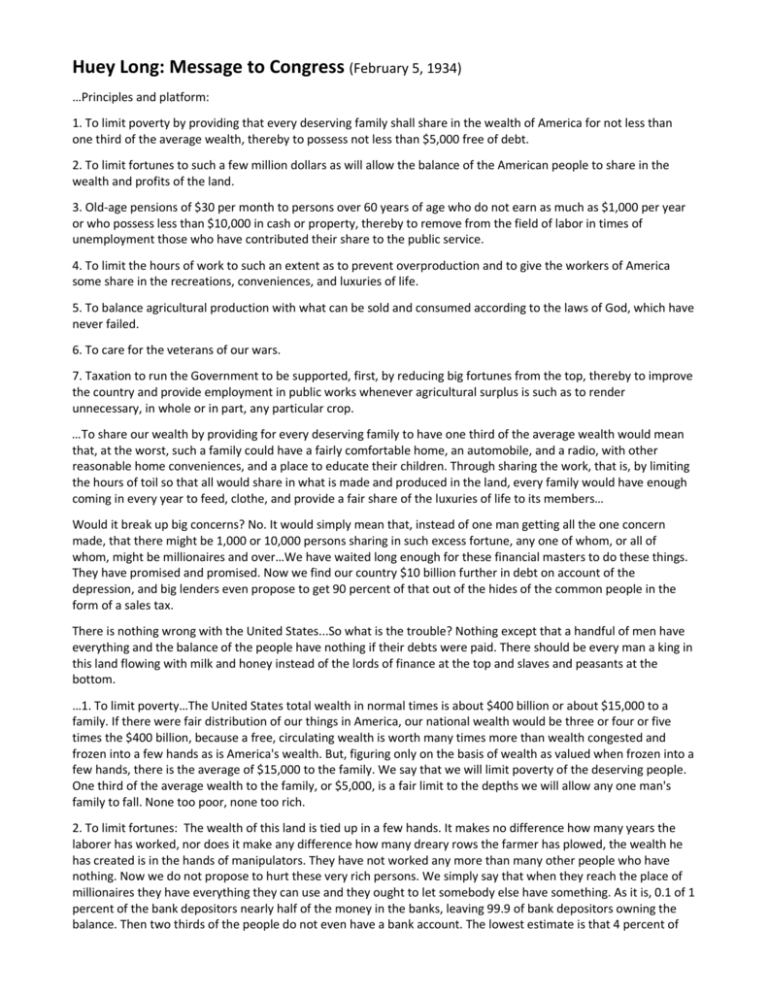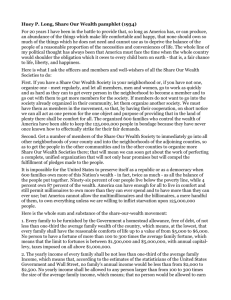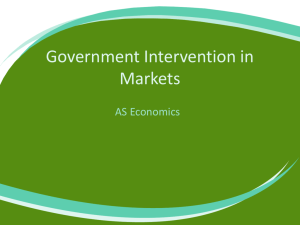Huey Long: Message to Congress (February 5, 1934)
advertisement

Huey Long: Message to Congress (February 5, 1934) …Principles and platform: 1. To limit poverty by providing that every deserving family shall share in the wealth of America for not less than one third of the average wealth, thereby to possess not less than $5,000 free of debt. 2. To limit fortunes to such a few million dollars as will allow the balance of the American people to share in the wealth and profits of the land. 3. Old-age pensions of $30 per month to persons over 60 years of age who do not earn as much as $1,000 per year or who possess less than $10,000 in cash or property, thereby to remove from the field of labor in times of unemployment those who have contributed their share to the public service. 4. To limit the hours of work to such an extent as to prevent overproduction and to give the workers of America some share in the recreations, conveniences, and luxuries of life. 5. To balance agricultural production with what can be sold and consumed according to the laws of God, which have never failed. 6. To care for the veterans of our wars. 7. Taxation to run the Government to be supported, first, by reducing big fortunes from the top, thereby to improve the country and provide employment in public works whenever agricultural surplus is such as to render unnecessary, in whole or in part, any particular crop. …To share our wealth by providing for every deserving family to have one third of the average wealth would mean that, at the worst, such a family could have a fairly comfortable home, an automobile, and a radio, with other reasonable home conveniences, and a place to educate their children. Through sharing the work, that is, by limiting the hours of toil so that all would share in what is made and produced in the land, every family would have enough coming in every year to feed, clothe, and provide a fair share of the luxuries of life to its members… Would it break up big concerns? No. It would simply mean that, instead of one man getting all the one concern made, that there might be 1,000 or 10,000 persons sharing in such excess fortune, any one of whom, or all of whom, might be millionaires and over…We have waited long enough for these financial masters to do these things. They have promised and promised. Now we find our country $10 billion further in debt on account of the depression, and big lenders even propose to get 90 percent of that out of the hides of the common people in the form of a sales tax. There is nothing wrong with the United States...So what is the trouble? Nothing except that a handful of men have everything and the balance of the people have nothing if their debts were paid. There should be every man a king in this land flowing with milk and honey instead of the lords of finance at the top and slaves and peasants at the bottom. …1. To limit poverty…The United States total wealth in normal times is about $400 billion or about $15,000 to a family. If there were fair distribution of our things in America, our national wealth would be three or four or five times the $400 billion, because a free, circulating wealth is worth many times more than wealth congested and frozen into a few hands as is America's wealth. But, figuring only on the basis of wealth as valued when frozen into a few hands, there is the average of $15,000 to the family. We say that we will limit poverty of the deserving people. One third of the average wealth to the family, or $5,000, is a fair limit to the depths we will allow any one man's family to fall. None too poor, none too rich. 2. To limit fortunes: The wealth of this land is tied up in a few hands. It makes no difference how many years the laborer has worked, nor does it make any difference how many dreary rows the farmer has plowed, the wealth he has created is in the hands of manipulators. They have not worked any more than many other people who have nothing. Now we do not propose to hurt these very rich persons. We simply say that when they reach the place of millionaires they have everything they can use and they ought to let somebody else have something. As it is, 0.1 of 1 percent of the bank depositors nearly half of the money in the banks, leaving 99.9 of bank depositors owning the balance. Then two thirds of the people do not even have a bank account. The lowest estimate is that 4 percent of the people own 85 percent of our wealth. The people cannot ever come to light unless we share our wealth, hence the society to do it. 3. Old-age pensions: Everyone has begun to realize something must be done for our old people who work out their lives, feed and clothe children and are left penniless in their declining years. They should be made to look forward to their mature years for comfort rather than fear. We propose that, at the age of 60, every person should begin to draw a pension from our Government of $30 per month, unless the person of 60 or over has an income of over $1,000 per year or is worth $10,000, which is two thirds of the average wealth in America, even figured on a basis of it being frozen into a few hands. Such a pension would retire from labor those persons who keep the rising generations from finding employment. 4. To limit the hours of work: This applies to all industry. The longer hours the human family can rest from work, the more it can consume. It makes no difference how many labor-saving devices we may invent, just as long as we keep cutting down the hours and sharing what those machines produce, the better we become. Machines can never produce too much if everybody is allowed his share, and if it ever got to the point that the human family could work only 15 hours per week and still produce enough for everybody…all of us could return to school a few months every year to learn some things they have found out since we were there… 5. To balance agricultural production with consumption…When we have a supply of anything that is more than we can use for a year or two, just stop planting that particular crop for a year either in all the country or in a part of it. Let the Government take over and store the surplus for the next year. If there is not something else for the farmers to plant or some other work for them to do to live on for the year when the crop is banned, then let that be the year for the public works to be done in the section where the farmers need work. There is plenty of it to do and taxes of the big fortunes at the top will supply plenty of money without hurting anybody. In time we would have the people not struggling to raise so much when all were well fed and clothed. Distribution of wealth almost solves the whole problem without further trouble. 6. To care for the veterans of our wars: A restoration of all rights taken from them by recent laws and further, a complete care of any disabled veteran for any ailment, who has no means of support. 7. Taxation…is to be levied first at the top for the Governments support and expenses. Swollen fortunes should be reduced principally through taxation. The Government should be run through revenues it derives after allowing persons to become well above millionaires and no more. In this manner the fortunes will be kept down to reasonable size and at the same time all the works of the Government kept on a sound basis, without debts. Things cannot continue as they now are. America must take one of three choices, viz: 1. A monarchy ruled by financial masters--a modern feudalism. 2. Communism. 3. Sharing of the wealth and income of the land among all the people by limiting the hours of toil and limiting the size of fortunes. …Wall Street controlled public press will give you as little mention as possible and will condemn and ridicule your efforts. Such makes necessary the organizations to share the wealth of this land among the people, which the financial masters are determined they will not allow to be done…Now that I am pressing this program, the lies and abuse in the big newspapers and over the radio are a matter of daily occurrence. It will all become greater with this effort. Expect that. Meantime go ahead with the work to organize a share-our-wealth society. THE AMERICAN LIBERTY LEAGUE (1935) The most important conservative group to emerge in opposition to the New Deal was the American Liberty League, founded in 1934 by a group of businessmen—mostly Democrats who ironically had supported FDR in 1932. One of the group’s leaders, Jouett Shouse, wrote the following to explain the reason for its existence. The Constitution of the United States amounts to a contract between the people and the officers of government: executive, legislative, and judicial. That contract del-egates to officials the power to do certain things and it forbids them to do certain other things. Contracts may be modified or cancelled, but only by mutual consent or by methods specified in the contracts. The Federal Constitution contains adequate provisions for its own modification through the orderly processes of amendment. If the American people wish to change the form of their government from a federal republic with limited powers to an absolute dictatorship or to state socialism, they can do so by appropriate amendments to the Constitution. However, so far, they have done nothing of the kind, and the existing contract is still binding, whether it is ob-served or not. One basic purpose of the American Lib-erty League is to see to it that this contract is complied with--faithfully, hon-estly, completely, and without evasion under the camouflage of giving new names to unconstitutional proposals.... The League’s aims are very definite. They are as public as it has been pos­sible to make them. They are embodied in its articles of incorporation as follows: The particular business and objects of the Society shall be to defend and uphold the Constitution of the United States and to gather and disseminate information that (1) will teach the necessity of respect for the rights of persons and property as fundamental to every successful form of govern-ment and (2) will teach the duty of government to encourage and protect individual and group initiative and enterprise, to foster the right to work, earn, save and acquire property, and to preserve the ownership and lawful use of property when acquired. It will be noted that the statement of principles links the “rights of persons and property.” There is a very good reason for that conjunction. In the view of those who comprise the membership of the League the superficially drawn distinction between "human rights" and "property rights" is a catch-phrase and nothing more. The two socalled categories of rights are inseparable in any society short of Utopia or absolute communism. To protect a man’s so-called human rights and strip him of his property rights would be to issue him a fishing license and then pro-hibit him from baiting his hook. Furthermore there is one very clear les-son to be learned from history--namely, that governmental disregard for property rights soon leads to disregard for other rights. A bureaucracy or despotism that robs citizens of their property does not like to be haunted by its victims. The prevention of governmental en-croachments upon the rights of citizens was one of the principal reasons for the division of the Federal Government into the legislative, judicial and executive branches. Where one man, or one bureau, is lawmaker, prosecuting attorney, judge, jury, and sheriff, there is no protection for the citizen. There is no justification, under the traditional American system of govern-ment, for permitting an executive bureau to issue orders having the force of laws and subjecting citizens to criminal or civil penalties; there is no justification for per-mitting an executive official to take over the legislative prerogative of levying taxes and specifying the purposes and manner of disbursement of taxes. The need for rigid observance of con-stitutional restrictions is always greater in emergencies than in more normal times because the emergencies produce constant pressure for disregard or evasion of limita-tions.... The American Liberty League believes that Congress, having been elected to represent the people, should not shirk its task by delegating authority to bureaus to promulgate arbitrary regulations having the force of laws. Likewise, the League believes that Congress should not attempt to delegate judicial power to executive bureaus. The courts of the nation and not government bureaus should pass upon questions of civil justice. It is also the belief of the League that the right to authorize the spending of public funds and to raise revenue is solely the function of the legislative branch of the government and that balanced budgets and sound fiscal policies are possible only while Congress retains its full responsibility for the nature and manner of spending public money. Long’s Speech to Congress Author Place & Time Prior Knowledge Audience Reason The Main Idea(s) Significance Liberty League








